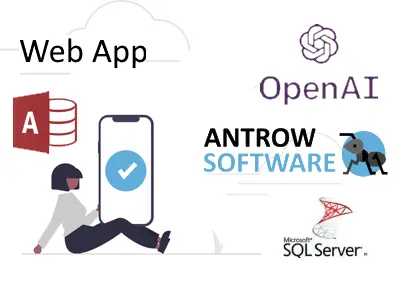Latest News
 Saturday, January 25, 2025
Saturday, January 25, 2025Revolutionizing MS-Access Migrations with AI
At Antrow Software, we’ve embraced the power of ChatGPT and Microsoft Copilot to bring faster, smarter, and more cost-effective solutions for migrating MS-Access databases to Web Apps and cloud platforms.
Here’s how AI is transforming the migration process:
- Lower Costs: Automation has significantly reduced development time, saving you money.
- Faster Results: Complex migrations are now completed in record time, minimizing delays.
- Improved Quality: AI ensures optimized, error-free solutions tailored to your unique needs.
- Focus on You: With smarter tools handling technical tasks, we can deliver a Web App that fits your business perfectly.
What’s in it for You?
By combining AI with our expertise, we’ve made it easier and more affordable to move your MS-Access databases to the cloud or Web App platforms like AWS or Azure. The result? Seamless access to your data and applications from anywhere, on any device.
In 2025, we look forward to continuing to provide innovative solutions to keep your business ahead.
Contact us today to learn how we can help you modernize your applications.
Visit antrow.com
Tags:
#MSAccess #DatabaseMigration #WebApp #CloudSolutions #ChatGPT #MicrosoftCopilot #AntrowSoftware #Innovatio

Customer stories
 Tuesday, February 28, 2023Author: Antrow Software
Tuesday, February 28, 2023Author: Antrow SoftwareJohn runs a medium-sized manufacturing company that produces custom-made parts for various industries. When John started his business, he managed his inventory and production process using spreadsheets and manual data entry. However, as his business grew, it became increasingly difficult to keep up with the demands of his customers.
John knew he needed a better solution and came across Antrow Software Development's production management software. After seeing a demo of the software and learning about its features, John was impressed and decided to implement it in his business.
The software allowed John to easily track his inventory, production schedule, and orders, giving him a real-time view of his business operations. He also appreciated the ability to generate custom reports and analyze his data to make informed business decisions.
The Antrow team worked closely with John during the implementation process, helping him to customize the software to fit his unique business needs. They also provided training to his team to ensure a smooth transition.
Since implementing Antrow's software, John's business has seen a significant improvement in efficiency and productivity. He's now able to quickly identify production bottlenecks and optimize his production schedule to meet customer demands. Additionally, the software has reduced errors and waste, helping him save money and improve his bottom line.
Overall, John is extremely happy with his decision to use Antrow Software Development's production management software. He credits the software and the team behind it with helping him to grow his business and stay competitive in his industry.

Latest articles
 Wednesday, May 3, 2023Author: Antrow Software
Wednesday, May 3, 2023Author: Antrow SoftwareOrganizations can profit from web-migrating Microsoft Access databases. Migration is difficult.
MS-Access to web migration is complicated. For companies without a development team, migration requires technical skills. Migrating significant amounts of data to a web-based platform can be time-consuming and complicated.
Ensuring the moved program works and meets user needs is another problem. Web-based platforms have different capabilities than desktop-based apps, so enterprises must ensure the migrated program works as intended and satisfies user demands.
Migrating MS-Access to the web raises security concerns. Organizations must safeguard sensitive data on web-based platforms from cyberattacks. Firewalls, encryption, and data access restrictions may be used.
Integrating the moved application with existing systems and procedures is another difficulty. To make the web-based platform work, organizations may need to change processes or add systems.
In conclusion, transferring MS-Access to the web can be beneficial yet difficult. Technical skills, user requirements, security, and web-based platform integration are required. Organizations can shift to a web-based platform with enhanced accessibility, scalability, and cooperation by carefully evaluating these concerns.